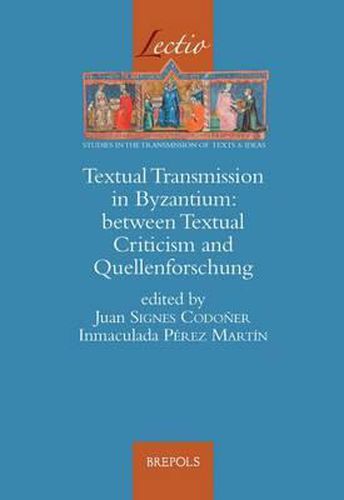Readings Newsletter
Become a Readings Member to make your shopping experience even easier.
Sign in or sign up for free!
You’re not far away from qualifying for FREE standard shipping within Australia
You’ve qualified for FREE standard shipping within Australia
The cart is loading…






A workshop was held in February 2012 in Madrid to stimulate a debate on textual criticism centred on the analysis of Byzantine texts and their modes of publication, rewriting and diffusion. The main aim was to provide future editors or scholars of the history of texts with a rich typology of concepts to guide their task, such as interpolation, paraphrasis, metaphrasis, quotation, collection, amplification or falsification, among others, but always taking into account that the principles upon which the discipline of textual criticism was founded needed to be reconsidered when dealing with the transmission of Byzantine texts. The present book brings together the different case studies produced by the participants of the workshop into a coherent whole and distributes them into five different sections according to their methodological approaches: 1. Language and style; 2. Virtual libraries and crossed readings; 3. Philosophical treatises and collections; 3.The sources of history; 5. Law texts and their reception. The results of the different approaches put forward by the contributors offer a broad palette of methodological strategies that are, to a great extent, complementary, and will, so we hope, illuminate the task of the future editors with new reflections.
$9.00 standard shipping within Australia
FREE standard shipping within Australia for orders over $100.00
Express & International shipping calculated at checkout
A workshop was held in February 2012 in Madrid to stimulate a debate on textual criticism centred on the analysis of Byzantine texts and their modes of publication, rewriting and diffusion. The main aim was to provide future editors or scholars of the history of texts with a rich typology of concepts to guide their task, such as interpolation, paraphrasis, metaphrasis, quotation, collection, amplification or falsification, among others, but always taking into account that the principles upon which the discipline of textual criticism was founded needed to be reconsidered when dealing with the transmission of Byzantine texts. The present book brings together the different case studies produced by the participants of the workshop into a coherent whole and distributes them into five different sections according to their methodological approaches: 1. Language and style; 2. Virtual libraries and crossed readings; 3. Philosophical treatises and collections; 3.The sources of history; 5. Law texts and their reception. The results of the different approaches put forward by the contributors offer a broad palette of methodological strategies that are, to a great extent, complementary, and will, so we hope, illuminate the task of the future editors with new reflections.